Indiana University Caves to Political Pressure by Suspending a Tenured Professor
There is a perfect storm of repression overtaking college campuses, generated by an unholy alliance of far-right Republican politicians.
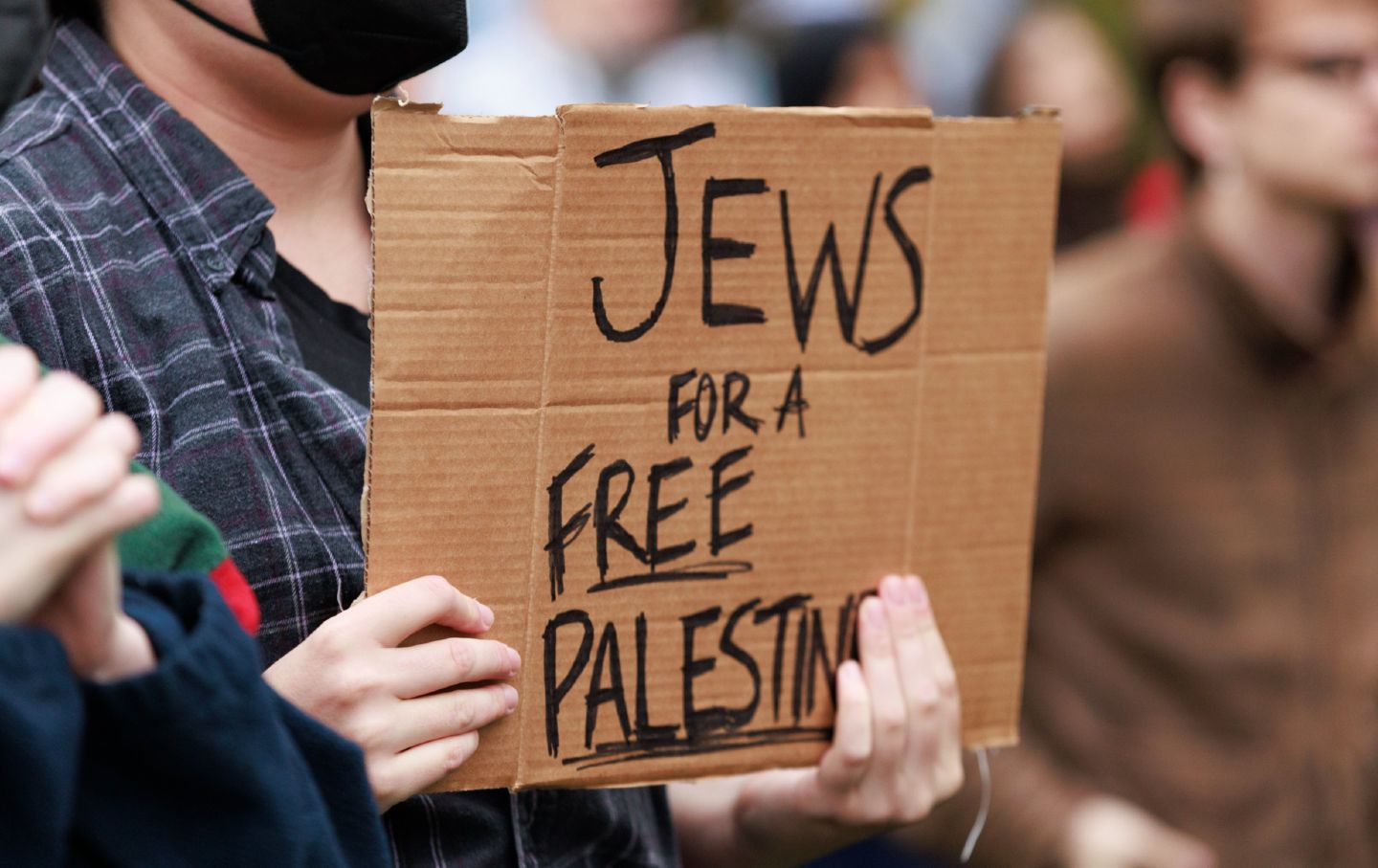
In late November, I wrote a piece The Nation headlined, “Congressman Jim Banks’s Pressure on Indiana University to Police Antisemitism is Duplicitous and Dangerous.” Banks responded by red-baiting me on X, formerly known as Twitter. He shared a photo of an edition of The Communist Manifesto that I edited in 2012, along with these words: “Radical Marxist Professor Jeffrey C. Isaac is attacking me for standing with Jewish victims of antisemitism at IU. I’m not sorry!… if you’re also a communist buy his latest book on Amazon.”
Indiana University higher administration was unmoved by this deliberate invocation of far-right tropes about Judeo-Bolshevism to attack a faculty member.
But it did not take long for the administration to demonstrate its responsiveness to Banks’s pressure, which was supported by a petition drive organized by an obscure, Republican-leaning group called “Jewish American Affairs Committee of Indiana” and reinforced by a local op-ed by an emeritus faculty toady that urged IU administration to do what Banks asked by cracking down on organizations like the IU student group Palestine Solidarity Committee (PSC).
And so, on December 15, Indiana University did exactly that. It suspended Professor Abdulkader Sinno, a tenured faculty member who has taught at IU for almost two decades and who, until his suspension, was the faculty adviser of the PSC.
The supposed reason for the suspension: alleged mistakes in the filing of a room reservation form to support a PSC event, a scheduled public lecture by Miko Peled, an Israeli American IDF veteran and peace activist. The alleged mistakes led the administration to demand cancellation of the event two days before it was scheduled to take place. The PSC went forward with the event, which proceeded without a hitch—until the administration claimed that the “unauthorized event” constituted reckless endangerment for which Sinno, as the group’s faculty adviser, was being held responsible.
After an “investigation” that violated numerous campus procedures, Vice Provost Carrie Docherty informed Sinno on December 15 that he was suspended from all teaching and mentoring of students for the spring and summer 2024 semesters. The grounds, according to the official suspension letter: “serious concerns about the effect your behavior may have on members of the campus community. These concerns are enhanced by the potential impact that your inattention to university compliance requirements has on the students you influence in the classroom and in your role as a student organization faculty advisor.”
These claims about Sinno are baseless. I was his department chair from 2003 to 2009, have been on the political science department’s personnel committee at least 15 times, and served as the committee’s chair for the past two years, during which time the committee has engaged in an extensive pre-promotion review of his record. The questions about Sinno’s character and professional responsibility have never come up, and seven peer reviewers have praised his classroom teaching, which focuses on Middle Eastern politics. Indeed, as I noted in a letter to the vice provost, which she has ignored, Sinno was recognized for his teaching with an Indiana University Trustees Teaching Award as recently as 2020.
The vice provost announced Sinno’s suspension as a fait accompli with no involvement of his two home departments, political science and Middle Eastern languages and cultures. According to university and campus policy (ACA-33, Section 5e, and BL-ACA-D27), the vice provost is required to refer the matter to the campus Faculty Misconduct Review Committee before making a decision. Instead, she acted on her own purported authority, brazenly disregarding policies that had been carefully crafted by faculty and administrators on the Bloomington Faculty Council.
The IU administration pretends that the suspension is a normal personnel matter involving the enforcement of commonsense university rules regarding space allocation and campus safety. It also pretends that the public pressure from Representative Banks, the Jewish American Affairs Committee of Indiana, and others has played no role in its doing exactly what these political actors have demanded.
Meanwhile, university administrators across the country are doing similar things in response to similar pressures to limit pro-Palestinian campus advocacy on their campuses. This is now so widely reported as to require no documentation here. But one example is worth noting. On November 10, Columbia University suspended two student groups, Students for Justice in Palestine and Jewish Voice for Peace. According to The New York Times, “the action was justified because the two groups had repeatedly violated university policies requiring them to get permission and give 10 business days’ notice before holding an event.” This is exactly the official rationale for the suspension of Sinno.
There is now a perfect storm of political repression rolling over American college campuses, generated by an unholy alliance of far-right Republican politicians like Banks, Representative Elise Stefanik, and former vice president Mike Pence; Jewish groups such as the Anti-Defamation League (ADL), American-Israel Public Affairs Committee (AIPAC), the Jewish American Affairs Committee of Indiana, and similar organizations elsewhere; and well-connected alumni mega-donors. This alliance has succeeded in pressuring university administrators across the country, leading to the constriction of campus space, the suspension of student groups, and, the deposing of two university presidents, Harvard’s Claudine Gay and University of Pennsylvania’s Liz Magill.
Popular
“swipe left below to view more authors”Swipe →As far as I am aware, Indiana University higher administration can now claim the honor of being the first major university in the United States demonstrate its commitment to “fighting antisemitism” by suspending a tenured professor who is also a Lebanese-born faculty adviser of the Palestine Solidarity Committee and the Muslim Student Association.
The suspension of Abdulkader Sinno is an injustice for him, his family, and his students. And with strong faculty support, he is pursuing a formal grievance, along with other legal measures, in the hope of restoring his status.
The suspension is also an affront to the entire IU community. It places into question the university’s commitment to academic freedom, civil liberties, and the free exchange of ideas about controversial matters that is at the core of any first-class public university. The IU Bloomington AAUP chapter has drafted a powerful public statement (see here). And a faculty group (of which I am a principal) is circulating an IU Faculty Letter in Support of Professor Abdulkader Sinno that criticizes the administration and demands our colleague’s immediate reinstatement. (The letter garnered more than 200 IU faculty signatures in the first 24 hours.)
But the issues extend far beyond academic freedom at Indiana University or indeed American higher education more generally.
The closure of public discourse about the current Israel-Hamas war and the broader Israeli-Palestinian conflict that is behind it threatens democratic politics itself. It is being driven by right-wing political forces, but it is working only with the passive acceptance if not complicity of many centrists, including many Democrats, who are either afraid to stand up in defense of academic freedom and open debate about the Middle East or are in fact willing to sacrifice democratic principles in the name of their partisan or tribal identities.
It is thus imperative that those of us who care about civil liberties, democracy, and human rights act locally while also thinking globally. We must work where we live to defend colleagues and students who are being punished for their advocacy while also working to defend democratic public spaces and institutions that are under attack. Unfortunately, many politicians and journalists who sound the alarm about the MAGA threat to democracy are willing to turn a blind eye to the wave of repression that is now overtaking all too many American campuses. This is an enormous mistake. Without academic freedom, there can be no meaningful democracy.
Disobey authoritarians, support The Nation
Over the past year you’ve read Nation writers like Elie Mystal, Kaveh Akbar, John Nichols, Joan Walsh, Bryce Covert, Dave Zirin, Jeet Heer, Michael T. Klare, Katha Pollitt, Amy Littlefield, Gregg Gonsalves, and Sasha Abramsky take on the Trump family’s corruption, set the record straight about Robert F. Kennedy Jr.’s catastrophic Make America Healthy Again movement, survey the fallout and human cost of the DOGE wrecking ball, anticipate the Supreme Court’s dangerous antidemocratic rulings, and amplify successful tactics of resistance on the streets and in Congress.
We publish these stories because when members of our communities are being abducted, household debt is climbing, and AI data centers are causing water and electricity shortages, we have a duty as journalists to do all we can to inform the public.
In 2026, our aim is to do more than ever before—but we need your support to make that happen.
Through December 31, a generous donor will match all donations up to $75,000. That means that your contribution will be doubled, dollar for dollar. If we hit the full match, we’ll be starting 2026 with $150,000 to invest in the stories that impact real people’s lives—the kinds of stories that billionaire-owned, corporate-backed outlets aren’t covering.
With your support, our team will publish major stories that the president and his allies won’t want you to read. We’ll cover the emerging military-tech industrial complex and matters of war, peace, and surveillance, as well as the affordability crisis, hunger, housing, healthcare, the environment, attacks on reproductive rights, and much more. At the same time, we’ll imagine alternatives to Trumpian rule and uplift efforts to create a better world, here and now.
While your gift has twice the impact, I’m asking you to support The Nation with a donation today. You’ll empower the journalists, editors, and fact-checkers best equipped to hold this authoritarian administration to account.
I hope you won’t miss this moment—donate to The Nation today.
Onward,
Katrina vanden Heuvel
Editor and publisher, The Nation
More from The Nation

Blind to Brutality: The Palestinian Death Toll Surpasses 70,000 Blind to Brutality: The Palestinian Death Toll Surpasses 70,000
Over 70,525 Palestinians have been killed in Gaza; scholars estimate that 80 percent were civilians, largely women and children.
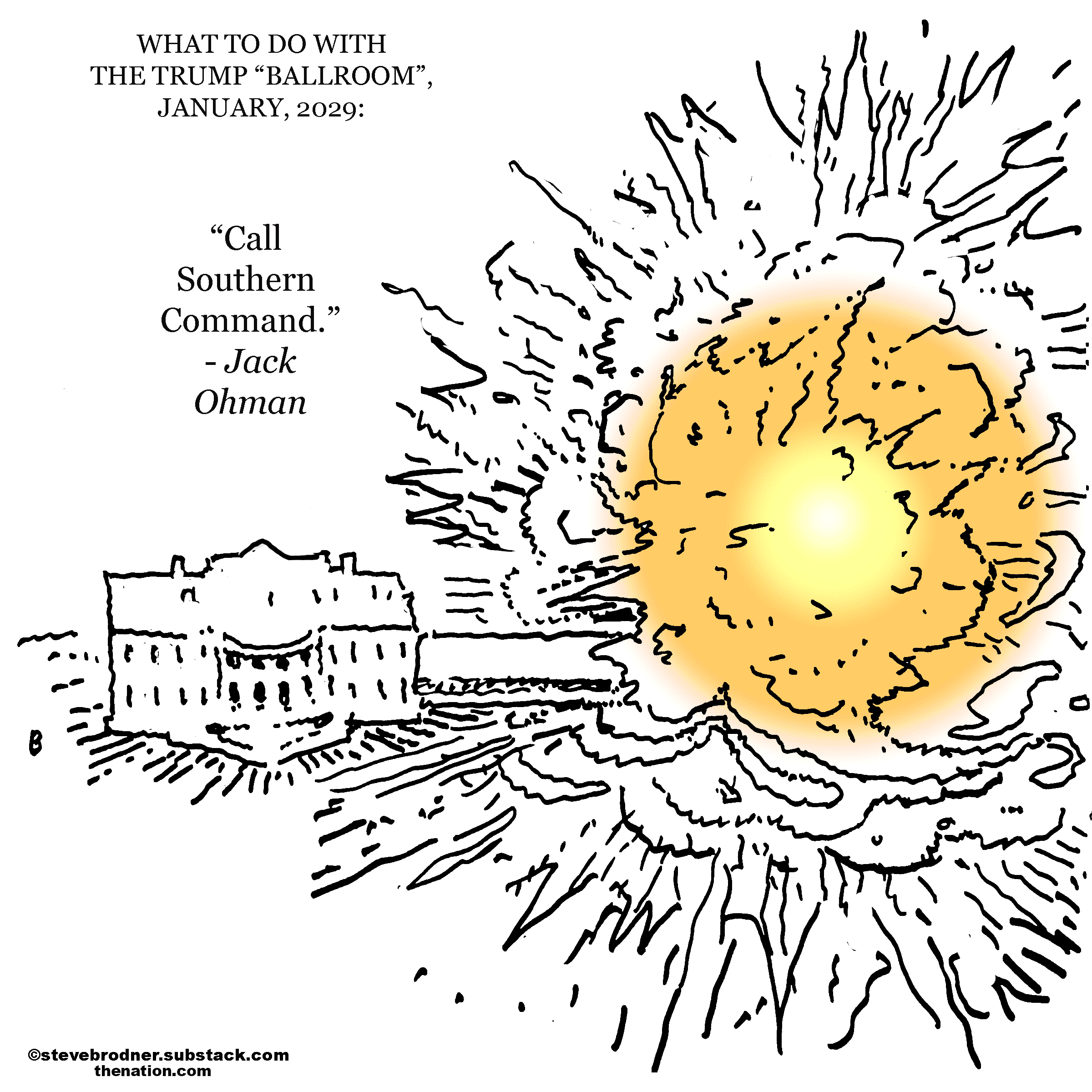

Israel Wants to Destroy My Family's Way of Life. We'll Never Give In. Israel Wants to Destroy My Family's Way of Life. We'll Never Give In.
My family's olive trees have stood in Gaza for decades. Despite genocide, drought, pollution, toxic mines, uprooting, bulldozing, and burning, they're still here—and so are we.
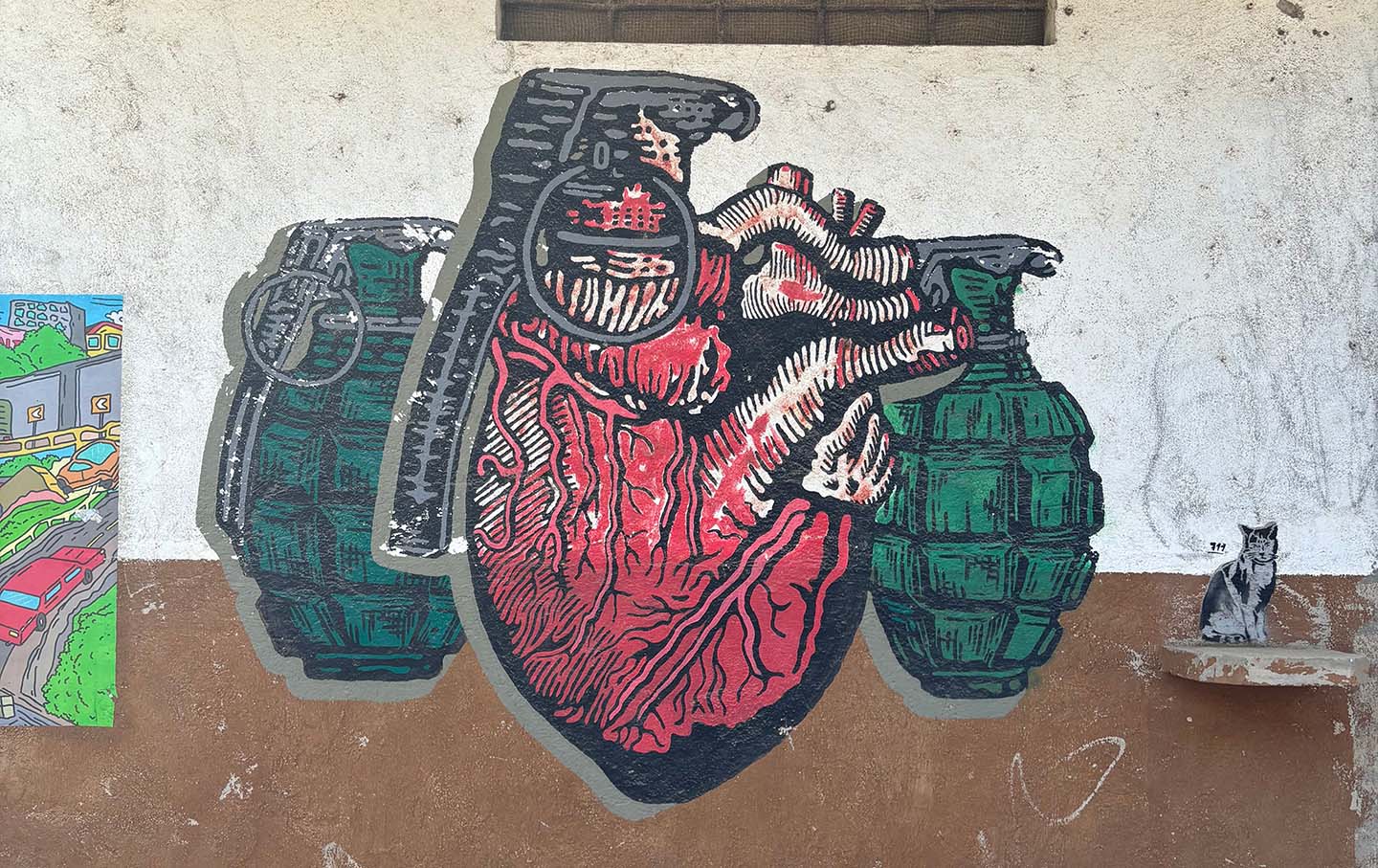
Destruction of Our Heart Destruction of Our Heart
From Gaza to Somalia, around the world people are struggling to survive.
OppArt / Anonymous and Peter Kuper
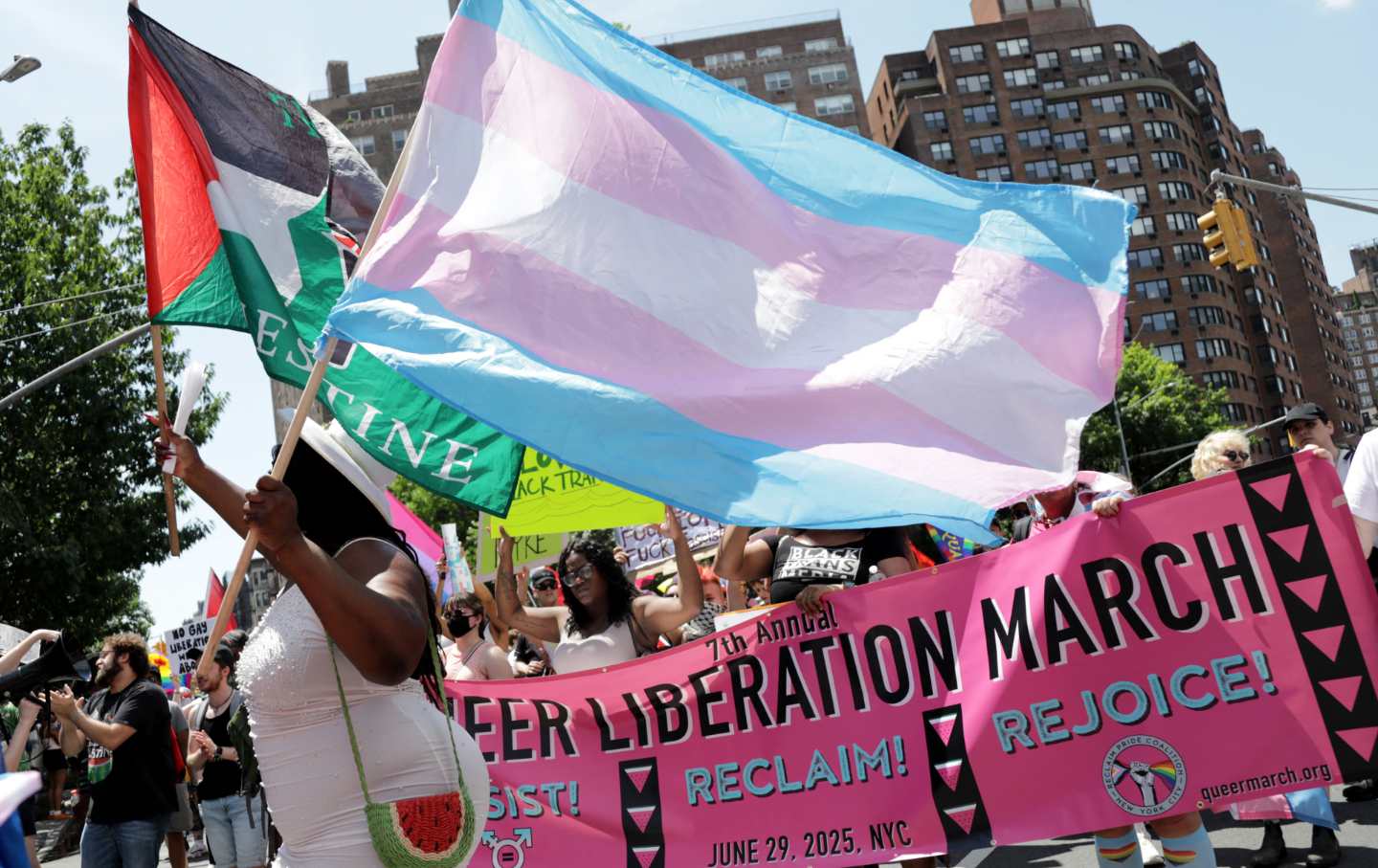
Why Palestine Matters So Much to Queer People Why Palestine Matters So Much to Queer People
Palestinian identity can “upend the whole world order, if done right, if spun right, if we activate it enough. And I think queerness is a very similar kind of identity.”
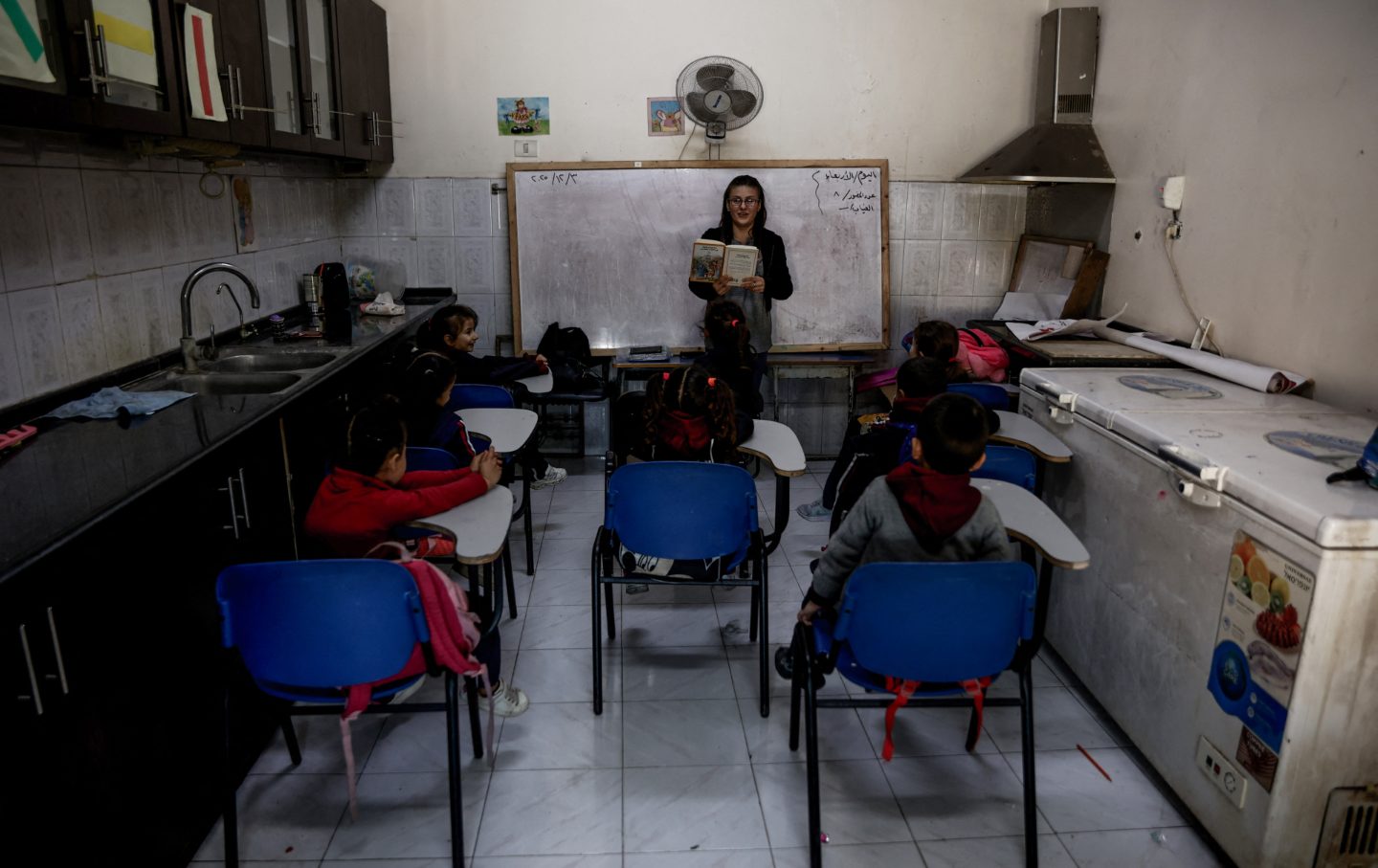
I’m a Teacher in Gaza. My Students Are Barely Hanging On. I’m a Teacher in Gaza. My Students Are Barely Hanging On.
Between grief, trauma, and years spent away from school, the children I teach are facing enormous challenges.


